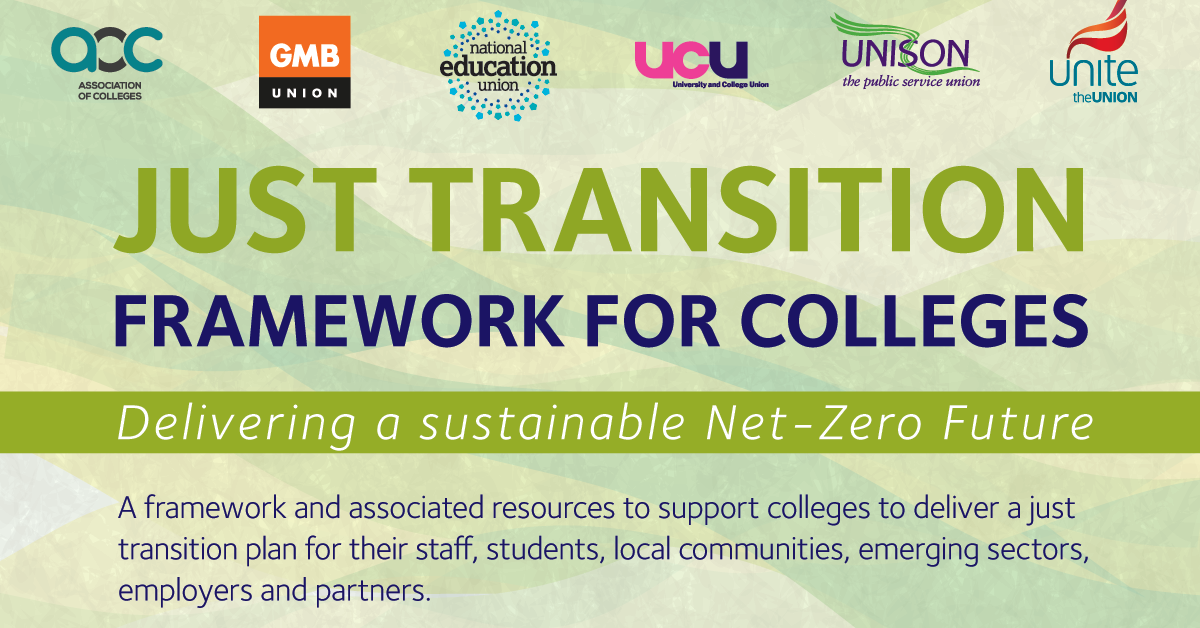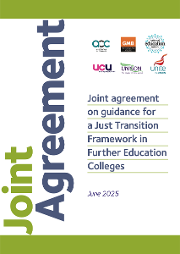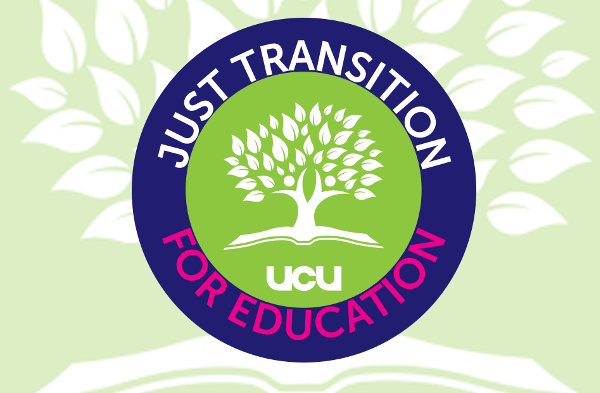
Just Transition Framework
26 June 2025
Trade unions and the English college employer body, the Association of Colleges (AoC), have reached a landmark agreement for a Just Transition road map for colleges.
Background
In 2023, and as part of the Joint Trades Unions (JTUs) further education pay claim 2023/24, a groundbreaking Just Transition climate and sustainability element was included for the first time. The claim looked to develop a more collaborative approach to support the FE sector to meet the challenges and opportunities presented through a transition to net zero:
'The scope of which could include sustainability, new skills, climate justice and a road map to achieving a carbon neutral sector by 2030.'
 A series of talks took place between the Association of Colleges (AoC) and the JTU's - UCU, Unite, GMB, NEU and Unison - which explored the different ways that the sector could work towards a 'Just Transition' and has resulted in the
A series of talks took place between the Association of Colleges (AoC) and the JTU's - UCU, Unite, GMB, NEU and Unison - which explored the different ways that the sector could work towards a 'Just Transition' and has resulted in the
![]() Just Transition Framework [390kb].
Just Transition Framework [390kb].
The unions and AoC are now asking individual colleges to adopt the framework, a key aspect of which is the recognition of the role that staff and trade union members play in progressing this work within colleges, and local communities.
The framework, launched on 26 June 2025, will be followed by a series of resources and training events to support UCU members at participating colleges.
Introduction to the Just Transition Framework
In advance of the wider launch, we held a briefings for our members and reps in FE to help members:
- understand the development of the agreement
- consider its implications for your institution
- examine how UCU locally can help drive its implementation
- consider what support you may need
- examine broader support both within and outside UCU.
A comprehensive training session will now follow for any Green Rep or branch officer with the necessary time off for training. The more in-depth session will look at the bargaining guidance to accompany the framework to ensure successful implementation at a local level.
 Just Transition Framework - Principles
Just Transition Framework - Principles
1: Leadership
Strategic commitment at all levels within a college is a fundamental prerequisite if the institution is to be successful in taking forward its sustainability and net zero aspirations. The commitment of leaders within the organisation is critical to encouraging and supporting staff at all levels to develop their skills and expertise, enhance career prospects, and provide
future job security and a just transition.
2: Workplace
It is crucial that the college creates an environment where colleagues feel valued and supported through this transition and the need for change to ensure a sustainable future for everyone and future job security.
The college will commit to support staff to enhance their existing skills, obtain new skills and develop expertise to equip them for the future opportunities created by the green economy
3: Impact and opportunities
Transparent accountability should be provided through consistent and effective mechanisms, regular evaluation and reporting, and a partnership approach between college and staff and student representative groups.
Just transition should be seen as an opportunity in which the potential benefits will outweigh any investment costs, and that these can be best achieved through a trusted partnership approach.
![]() Read the full Framework here. [390kb]
Read the full Framework here. [390kb]
 FAQs
FAQs
Q: What is 'Just Transition'?
A Just Transition involves maximising the social and economic opportunities of climate action, while minimising and carefully managing any challenges or hazards that may be experienced by workers and communities, particularly in regard to livelihoods and wellbeing. This is through effective dialogue among all groups impacted and respect for fundamental labour principles and rights.
Q: This Just Transition is all about people moving from jobs in the oil and petrochemical industries into other jobs, isn't it?
While conversations around Just Transitions are often centered on oil and gas workers, all workers will be impacted in different ways by the climate crisis and therefore need to be supported through a Just Transition. For example, educators in FE will need to ensure all their students, regardless of discipline, are equipped for a net-zero economy, and will therefore have to adapt teaching and learning.
Essentially, a Just Transition ensures a move away from carbon intensive industries leaves no one behind.
Q: We are hearing a lot about AI - will this make all workplaces Green?
AI can be a useful tool to supporting sustainability initiatives, including by analysing data and monitoring the environment. However, the environmental impacts of widespread and scaled-up AI use are concerning, as AI data centres use a lot of energy and are often powered through fossil fuels. AI also uses water to cool electrical components in data centres.
Some scientists also warn of the unintended negative consequences to sustainability, of using AI, for example, the threat of AI-powered misinformation through text and images.
(Source: UNEP)
Q: What can we do to persuade our employer to be more environmentally conscious?
There are many ways to persuade our employers to be more environmentally conscious.
Firstly, students and staff are demanding that sustainability be embedded into places of learning. SOS-UK has over a decade of research on what students want to learn and how, which can provide a helpful evidence base for employers, and increase the reputation of institutions amongst students.
Other arguments you can make include:
- publicly funded institutions are tasked with the mission of advancing public good. As the climate crisis worsens, further education institutions need to ensure this is addressed through their governance, estates, and teaching and learning
- similarly, the climate crisis and its associated challenges is the most pressing issue of our time. Ensuring both students and educators are equipped to deal with a changing world and society is simply good, fit for purpose teaching and learning.
- some organisations, including EAUC - The Alliance for Sustainability Leadership in Education - provide resources demonstrating how incorporating sustainability into university and colleges is 'just good business' and financially important in the long-term - EAUC's Sustainability Guide for Governors.
Q: Now that the Association of Colleges and the trade unions have signed up to the Just Transition Framework does our college have to implement this framework? What will they have to do?
Through the Just Transition Framework, the Association of Colleges and trade unions are calling on - and strongly encouraging - colleges to utilise the framework.
The framework highlights key principles, and examples of good practice to embed these principles into leadership and workplace.
UCU has also created additional resources, including a Just Transition policy/plan template. A Just Transition Bargaining Guide will shortly be published to support UCU members to hold their college accountable.
Joint Trade Unions and the AoC have agreed to evaluate the pilot use of the framework to understand its impact on workers, students, senior leaders and other stakeholders. Findings from the evaluation will be used to improve the framework and share it more widely.
Q: The UK government seem to be saying that growth is more important than being Green - is it possible to have growth that is Green?
If growth is predicated on indefinite use of finite resources, as well as continued use of fossil fuels, then it is not possible to have sustainable, green growth. However, it is possible to positively transform society, communities and the world so that access to resources, healthy and good food, services, housing etc. is shared equally and not hoarded by a small group of the world's richest.
The concept of degrowth questions governments focus on quantity, instead of quality, and urges us to reconsider how we can put wellbeing ahead of profit.
(Source: Nature, Jason Hickel)
Q: I'm just one member in my workplace, what can I do to make a difference?
Encourage other members to get involved - UCU CPD can deliver branch training on a range of sustainability topics including embedding sustainability in the curriculum, decolonising and decarbonising education, collaborating with students for climate justice and many others.
Attend Green New Deal Bargaining training to learn how to use the UCU Green New Deal framework to progress sustainability claims within your work place
Collaborate and organise with students - get to know your students' union and their campaigns. If you are unsure how to get in touch with your students' union, email sos-uk@ucu.org.uk for support.
Q: Me and my colleagues really care about the environment but our employer doesn't seem to want to listen. We have got the UCU branch supporting us, but the employer still won't listen! What can we do?
Please get in touch with us here at environment@ucu.org.uk and we will happily facilitate a planning session on how to build a successful campaign to help get your employer to listen and engage.
Q: What kind of support can I get from UCU to progress sustainability and a Just Transition in my workplace?
UCU CPD can deliver branch training on a range of sustainability topics including embedding sustainability in the curriculum, decolonising and decarbonising education, collaborating with students for climate justice, and many others.
Attend Green New Deal Bargaining training to learn how to use the UCU Green New Deal framework to progress sustainability claims within your work place
There are also a range of Green New Deal Bargaining Guides.
Q: I'm not based in England. How can I get involved?
The Just Transition Framework has been developed through negotiations with Association of Colleges, a membership organisation supporting 90% of FE providers in England.
UCU members outside of England who are interested in doing something similar can email environment@ucu.org.uk. We can also link you up with the relevant networks in Wales or Northern Ireland and provide specific support for your branch.
Additionally, the
![]() Just Transition Framework [390kb] is available online for anyone to use.
Just Transition Framework [390kb] is available online for anyone to use.
Other resources
Leadership
- Making the Business Case for Sustainability: a Guide for Sustainability Leaders by EAUC
- Sustainability guide for members of governing bodies by EAUC
- FE Climate Action Roadmap
- EAUC Leadership Lab
 Workplace
Workplace
- UCU CPD training on embedding sustainability into education and other related topics
- Green rep training
- Green New Deal and Green New Deal Quick Guides
- SOS-UK Learning Academy offering bespoke and existing training for staff and students
- Info on UCU environment⁄green rep
- Info on Unison environment rep
Impact and opportunities
- Student-led curriculum mapping supported by SOS-UK
- SDG Teach In - annual campaign supporting educators to embed sustainability in learning
- SDG Teach In 2025 Campaign Report
- Sustainability Research by SOS-UK
- Sustainability Skills survey - exploring what students want to learn and how
- Education and Training Foundation (ETF) - resources on education for sustainable development
Overarching resources
- Responsible Futures - whole institution approach and accreditation to working with students to embed sustainability in learning.
- PrintPrint this page
- Share

